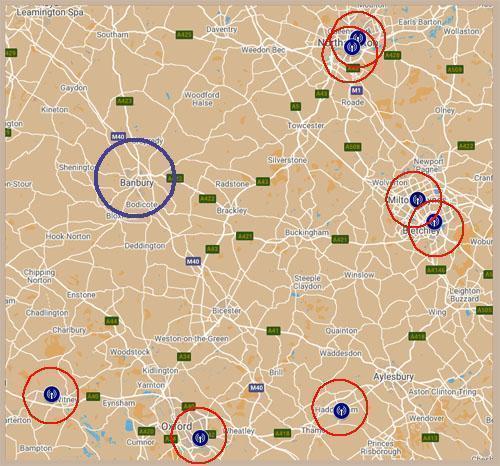This website uses cookies so that we can provide you with the best user experience possible. Cookie information is stored in your browser and performs functions such as recognising you when you return to our website and helping our team to understand which sections of the website you find most interesting and useful.
Our campaign for an FM licence
 This page gives you an update on our campaign to be able to broadcast to traditional FM radio.
This page gives you an update on our campaign to be able to broadcast to traditional FM radio.
You can also read about our part in plans to bring local digital radio to our area.
Background
Banbury FM currently broadcasts using IP, often called “over the internet”. We can be heard on smart speakers, computers and tablets, smart phones and IP enabled radios. Whilst the number of people listening this way is quickly increasing, particularly on smart speakers, some people still want to be able to hear us on traditional radios.
The broadcasting regulator, Ofcom, are introducing local digital radio across the country, but we believe many people still want to listen on FM.
Ofcom told us they would consider our case and so a well supported, and comprehensive submission was made in December 2021. Ofcom rejected the case in January 2022.
The Banbury FM team have not given up and will continue to lobby for our area to be given the same access to FM broadcasting as other areas already have.

Google maps
Why should the regulator give us an FM licence
There are three licenced local FM radio services for Banbury: Oxford based BBC Radio Oxford, Heart (which broadcasts from Fareham and London) and Capital (which broadcasts from near Birmingham and London). All three services provide a pitiful amount of news and information for our area – just the bare minimum as required by their licence.
In other local areas Ofcom have allowed FM community stations – shown by red circle on this map. Banbury is clearly overlooked.
Our case from FM to Ofcom
Banbury wrote to Ofcom in July 2021 requesting that they consider a further round of FM community radio licencing for areas such as Banbury. Ofcom replied saying:
Although we do not currently plan to invite applications for analogue licences while we are in the process of licensing small-scale DAB services, we may consider exceptional cases to our policy on the prioritisation of small-scale-DAB.
This provides stakeholders with an opportunity to justify why Ofcom should consider a local round of analogue licensing for their specific area against Ofcom’s current policy prioritisation. It should be noted however that the bar for exceptions to our policy is very high.
Banbury FM put together a robust and well reasoned case. Motions of support were passed at Banbury Town Council, Cherwell District Council and Oxfordshire County Council. MP Victoria Prentis agreed to write in support of our plans and a number of charities, local businesses and individuals did the same.
On December 14, 2021 we submitted our case to Ofcom. Amongst the points we raised the document highlights:
- We are the only station currently offering a quality local news and sports service, local travel and events information, support for local charities, organisations and businesses and coverage of the democratic process and local music scene.
- Whilst Ofcom wish to prioritize the small-scale DAB digital radio rollout, we are concerned that 33% of the homes do not have a DAB radio (according to independent research). Many nearby areas have FM community stations (such as Witney and Oxford) so people living there without DAB radios will still be able to listen on FM. Currently that would not be the case in Banbury. With the cost of DAB equipment being so much more than FM radios this is most likely to affect the those in our community who are already the most deprived.
- The area Banbury FM wishes to target with an FM transmitter has seen the 15+ aged population grow by 9% since 2011. There are far more adults aged 45 and over than those under 45. However the existing licenced FM services for Banbury target the younger audience, leaving the older audience underserved.
- We provided an analysis of the pitiful amount of coverage our town receives from other so called “local” broadcasters.
- We focused on our area’s identity and unique geographic position, together with the need to support now in a post-pandemic world.
We are not alone
Banbury FM’s campaign made the national trade media and that encouraged a large number of other stations around the country, who are in a similar position, to get in contact. They too believe that Ofcom need to act to allow local people to have access to a local community station on FM.
Existing stations
Whilst not licencing any new stations Ofcom have been handing out extra FM frequencies to existing community stations, allowing them to extend their coverage areas.
We feel it is not fair some parts of the country are being denied a community radio service but at the same time Ofcom are allowing other stations to use any spare capacity to grow mini networks.
Ofcom say NO
 At the end of January 2022 Ofcom replied to Banbury FM’s submission, but rejected the case saying they did not feel Banbury’s case was “exceptional”. They said only exceptional cases would be considered as a reason to spend time advertising further FM licences during a period when the broadcast team’s main work was rolling out Small Scale Digital Radio multiplex licences.
At the end of January 2022 Ofcom replied to Banbury FM’s submission, but rejected the case saying they did not feel Banbury’s case was “exceptional”. They said only exceptional cases would be considered as a reason to spend time advertising further FM licences during a period when the broadcast team’s main work was rolling out Small Scale Digital Radio multiplex licences.
The regulator did not investigate Banbury FM’s assertion as to how well Banbury was served by other radio stations, but noted a similar case could be put forward elsewhere in the country.
They did accept that a community station for our town would have benefits.
In summary the regulator said: “We do not consider the circumstances you have set out in your email to warrant Ofcom departing from its current policy prioritisation to license small-scale DAB services instead of analogue community (or commercial) radio licences.”
Next steps
Banbury FM intends to continue campaigning for an FM licence to be made available for our area.
We also believe that whilst Ofcom is refusing to allow areas such as Banbury an FM frequency, they should stop handing out new frequencies to existing licences. In doing so they risk jeopardising any future new station’s chances of being allowed an FM frequency through lack of availability due to nearby stations having been allowed all the available resource locally.
It is also imperative that the DCMS and Ofcom begin a complete review of the FM waveband which currently has the BBC and two major groups utilising huge swathes of the available capacity for pseudo-national programming.
Our campaign continues…
